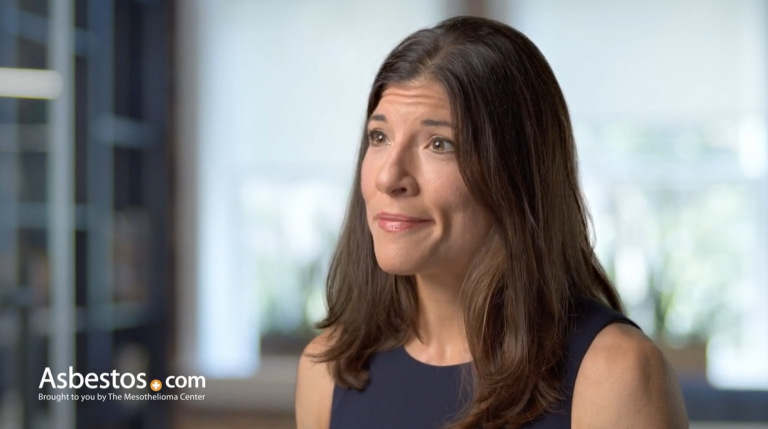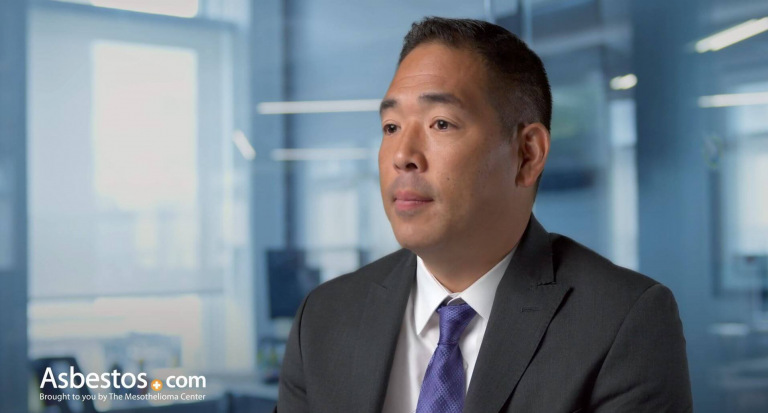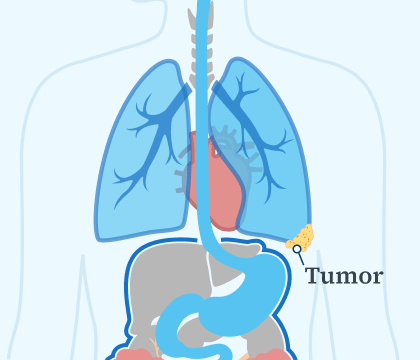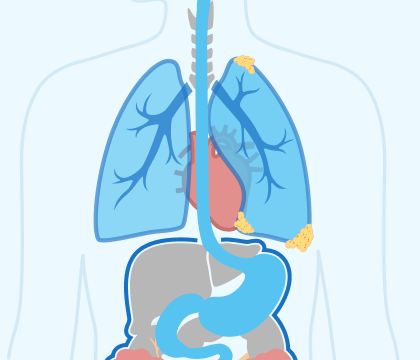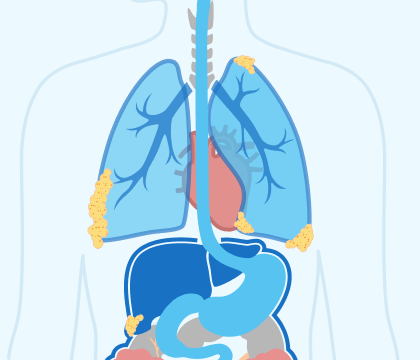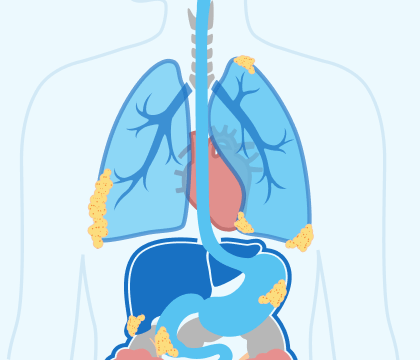Mesothelioma
Malignant mesothelioma is a cancer that develops in the thin tissue that lines certain internal organs. This thin tissue is called the mesothelium. The most common type of mesothelioma is called pleural mesothelioma, and it affects the lining of the lungs.
Written by Dr. Daniel Landau • Edited By Walter Pacheco • Medically Reviewed By Dr. Jacques Fontaine
Asbestos.com is the nation’s most trusted mesothelioma resource
The Mesothelioma Center at Asbestos.com has provided patients and their loved ones the most updated and reliable information on mesothelioma and asbestos exposure since 2006.
Our team of Patient Advocates includes a medical doctor, a registered nurse, health services administrators, veterans, VA-accredited Claims Agents, an oncology patient navigator and hospice care expert. Their combined expertise means we help any mesothelioma patient or loved one through every step of their cancer journey.
More than 30 contributors, including mesothelioma doctors, survivors, health care professionals and other experts, have peer-reviewed our website and written unique research-driven articles to ensure you get the highest-quality medical and health information.
About The Mesothelioma Center at Asbestos.com
- Assisting mesothelioma patients and their loved ones since 2006.
- Helps more than 50% of mesothelioma patients diagnosed annually in the U.S.
- A+ rating from the Better Business Bureau.
- 5-star reviewed mesothelioma and support organization.
Testimonials
My family has only the highest compliment for the assistance and support that we received from The Mesothelioma Center. This is a staff of compassionate and knowledgeable individuals who respect what your family is experiencing and who go the extra mile to make an unfortunate diagnosis less stressful. Information and assistance were provided by The Mesothelioma Center at no cost to our family.LashawnMesothelioma patient’s daughter
How to Cite Asbestos.com’s Article
APA
Landau, D. (2024, April 11). Mesothelioma. Asbestos.com. Retrieved April 16, 2024, from https://www.asbestos.com/mesothelioma/
MLA
Landau, Daniel. "Mesothelioma." Asbestos.com, 11 Apr 2024, https://www.asbestos.com/mesothelioma/.
Chicago
Landau, Daniel. "Mesothelioma." Asbestos.com. Last modified April 11, 2024. https://www.asbestos.com/mesothelioma/.
- Causes: Asbestos exposure is the primary cause of mesothelioma.
- Symptoms: Common mesothelioma symptoms are chest pain, cough and shortness of breath.
- Treatment: Treatment options include surgery, chemotherapy, radiation and immunotherapy.
- Life Expectancy: The average life expectancy for mesothelioma patients is 12 to 21 months.
What Is Malignant Mesothelioma?
Malignant mesothelioma is an aggressive cancer. It develops in the thin protective lining (mesothelium) around the lungs, abdomen, heart or testes. As this rare cancer progresses, mesothelial tumors can spread or metastasize to the lining of other organs and lymph nodes.
Doctors classify mesothelioma based on where it forms on the mesothelium throughout the body. Symptoms, treatment and prognosis depend on where the cancer develops.
Tumor location determines the four types of mesothelioma:
- Pleural Mesothelioma
-
The most common type of mesothelioma is pleural. It forms in the pleura, the protective lining around the outside of the lungs.
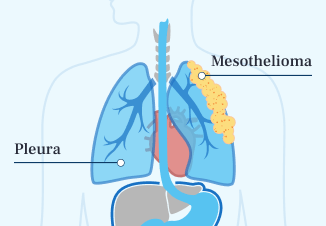
- Peritoneal Mesothelioma
-
The second-most common type is peritoneal, which forms in the abdominal lining. It has a much higher survival rate, and surgery is typically more successful than with pleural mesothelioma.
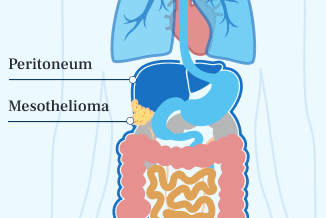
- Pericardial Mesothelioma
-
The pericardial type affects about 1% of patients. Treatment options are much more limited. The median survival is 2 to 6 months.
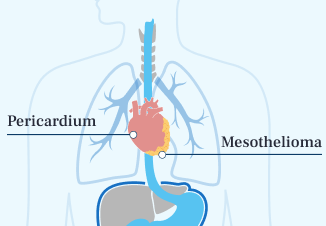
- Testicular Mesothelioma
-
The rarest type is testicular mesothelioma. Treatment options are much more limited, but about one-third of patients live for at least 10 years.
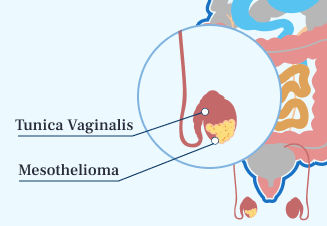
Work sites, such as factories and construction areas, are the most common sources of asbestos exposure. Historically, companies used asbestos in older buildings because of its low cost, resiliency, and resistance to heat and electricity. Asbestos is still present in many older building materials and consumer products.
Military veterans are also at risk of developing mesothelioma because asbestos was used extensively on Navy ships, military bases, barracks and other military locations and machinery.

What Are the Symptoms of Mesothelioma?
Common symptoms of mesothelioma are dry cough, shortness of breath, chest pain, abdominal pain and unexplained weight loss. The location of cancer determines which symptoms develop and how severe they can become.
Respiratory symptoms of pleural mesothelioma primarily affect the lungs and chest cavity. These can include a painful and dry cough, wheezing and chest pain. Symptoms of peritoneal mesothelioma develop in and around the abdomen and include abdominal swelling, nausea, distension and pain.
70%
Percentage of asbestos-related cancer patients diagnosed with mesothelioma.
Pericardial mesothelioma may cause unique symptoms such as heart palpitations and murmurs. Symptoms of testicular mesothelioma include testicular swelling and pain.
- Abdominal pain
- Abnormal lumps
- Chest pain
- Fatigue
- Fever and sweating
- Fluid buildup
- Loss of appetite
- Muscle weakness
- Swelling
- Unexplained weight loss
Fatigue, weight loss and fever commonly occur in other cancers. Mesothelioma misdiagnosis is frequent because its symptoms can resemble other cancers and illnesses.
Talk to your doctor if you have been exposed to asbestos in the past and are experiencing these symptoms. Early diagnosis of any disease often leads to a better prognosis and longer life expectancy.
What Causes Mesothelioma?
Asbestos is the primary cause of mesothelioma. Repeated exposure to asbestos-contaminated products, such as talc and older construction materials, increases the risk of developing mesothelioma.
Asbestos fibers get stuck in tissues that line and protect vital organs. Over decades, the fibers cause irritation and DNA damage. This damage turns normal cells into cancer cells, which develop into mesothelioma tumors. An average of 20 to 60 years passes between the first asbestos exposure and the development of symptoms, which is called the mesothelioma latency period.
Pleural mesothelioma is the most common kind. It forms when someone breathes in asbestos fibers, and they stick to the protective lining of the lungs (pleura). Peritoneal mesothelioma can develop in the abdominal lining if someone breathes in or swallows asbestos fibers.
Patients inhale or ingest asbestos, which causes chronic inflammation in the mesothelium. This can lead to genetic changes where cell DNA changes into a mesothelioma cancer cell.
19,000
The number of people in the U.S. exposed to asbestos The Mesothelioma Center at Asbestos.com has helped since 2017.
Occupational asbestos exposure is the No. 1 cause of mesothelioma. Construction workers, industrial workers, firefighters, military veterans and those in similar occupations may have been exposed to asbestos.
If you or a loved one was exposed to asbestos long ago, monitoring for signs of disease with X-rays and other tests can help catch mesothelioma cancer early. Tell your doctor about your exposure and ask how frequently you should be tested.
Diagnosing & Staging Mesothelioma
A biopsy is necessary to confirm a mesothelioma diagnosis. If mesothelioma cancer is suspected, doctors will recommend taking a tissue sample, also known as a biopsy. Doctors use this tissue sample to look for the presence of specific malignant mesothelioma cells.
Doctors use several other tests to diagnose mesothelioma. Blood tests may be used, but they cannot detect mesothelioma alone. Most people initially undergo a chest X-ray.
If abnormal growth or fluid around the lung is detected, doctors recommend imaging scans, such as CT, MRI or PET.
After a mesothelioma diagnosis, your doctor will review your pathology report to determine the cancer’s cell type. The three primary types of mesothelioma cells respond differently to treatment, and prognosis varies for each cell type.
Staging and Mesothelioma Cancer Diagnosis
Determining the cancer stage is important because it helps doctors make treatment plans and predict patient prognoses. The four stages of mesothelioma range from stage 1 (early-stage) to stage 4 (late-stage).
The Four Stages of Malignant Mesothelioma
The stages of mesothelioma advance as tumors grow and spread.
These stages are based on tumor size and location. Each type of mesothelioma grows and spreads uniquely depending on where the tumors originated.
Median life expectancy for pleural mesothelioma ranges from 14.9 months to 22.2 months, depending on the stage. Treatments your doctor recommends are primarily based on the cancer’s stage, cell type and your overall health.
Free Mesothelioma Nutrition Guide
Eating the right diet throughout mesothelioma treatment can ease your symptoms.

Mesothelioma Treatment Options
The standard treatment for mesothelioma may include surgery, chemotherapy, immunotherapy and radiation. Doctors develop individualized treatment plans based on cancer location, cell type and stage.
People diagnosed in the early stages of mesothelioma benefit most from multimodal therapy using surgery, chemotherapy and radiation. Surgical and palliative treatment options vary by cancer location. The sarcomatoid cell type limits treatment options, while the epithelial cell type responds best to all forms of treatment.
“Supportive care medicine is a new specialized branch of medicine that reduces pain, increases appetite and boosts morale,” said Dr. Jacques Fontaine, director of the Mesothelioma Research and Treatment Center at Moffitt Cancer Center. “Every mesothelioma patient should ask to be seen by this type of medical specialist, in addition to a thoracic surgeon and medical oncologist.”
Some patients may be eligible for mesothelioma clinical trials that test newer therapies. Though not every mesothelioma treatment is suitable for each patient, most patients benefit from palliative care to help manage symptoms of mesothelioma.
Mesothelioma survivor still soaring the skies
Diagnosed in 2017, pleural mesothelioma survivor Daniel McCarthy stays remarkably active at 82. After surviving aggressive surgery performed by specialist Dr. Abraham Lebenthal at the Boston VA Hospital, McCarthy underwent chemotherapy and radiation, which slowed him but didn’t stop his push to stay engaged. Today, he walks daily, reads considerably and writes about his adventures.
Finding Mesothelioma Treatment
Finding a mesothelioma specialist at a top mesothelioma treatment center is the best way to benefit from the latest therapies and improve a mesothelioma prognosis. Mesothelioma specialists understand more about the disease and its treatment than general oncologists.
Top mesothelioma doctors have years of experience developing personalized treatment plans for patients. They can access the latest treatments and medical technology at renowned cancer centers and work on multidisciplinary teams to provide a comprehensive mesothelioma treatment plan. Our Patient Advocates help people get appointments with these experts throughout the U.S.
“Patients are surprised that we can schedule and register them with a specialist for a second opinion,” said Danielle DiPietro, a Patient Advocate with The Mesothelioma Center.
Peritoneal mesothelioma survivor, Kasie Coleman said “not many doctors have knowledge treating mesothelioma. Everyone should get a second opinion. If not for a second opinion, I wouldn’t have survived.”
Although most doctors do not have experience diagnosing or treating mesothelioma, you can find mesothelioma specialists across the U.S.

Understanding Your Mesothelioma Prognosis
Life expectancy for people with mesothelioma is about 12 months with treatment, which is why the prognosis is generally poor for most patients. About 12% of people with pleural mesothelioma and 65% with peritoneal mesothelioma live for five years or longer.
The most important thing I try to convey to patients is the importance of optimism. While mesothelioma is a very ugly disease, we focus on the things that give us a better chance for them.
While you can’t change your age or cancer stage, you can decide to get treatment and adopt a healthy lifestyle. Mesothelioma patients who make these types of positive changes may also experience remission, a period of having no signs or symptoms of cancer.
- Explore clinical trials: These trials test new medicines that could boost your prognosis. Some patients see positive results with drugs still being studied.
- Adopt a healthier lifestyle: Simple exercises and a balanced diet can ease side effects and enhance how you feel during cancer treatment.
- Join a support group: Being part of a support group reduces anxiety, emotional distress, fatigue and pain, helping you cope better.
- Try relaxation techniques: Practices like guided imagery and progressive muscle relaxation may assist you in handling your diagnosis more effectively.
What Should I Do After My Mesothelioma Diagnosis?
The impact of a rare cancer diagnosis such as mesothelioma can feel like too much to handle. Worrying and feeling confused about how to move forward is expected.
- Find individualized treatment through a mesothelioma specialist. The Mesothelioma Center’s Doctor Match Program can help.
- Look into emotional support options such as support groups and counseling. The Mesothelioma Center hosts a monthly virtual mesothelioma support group.
- Caregivers should develop a system of support to avoid burnout. Take time off, find resources for your family and use healthy coping mechanisms to process stress.
- Financial assistance options provide compensation for medical expenses. Asbestos trust funds also provide compensation for mesothelioma.
- Veterans with mesothelioma may access specialized health care, disability compensation, caregiver benefits and more through the VA.
Focus on getting excellent treatment and know there are steps you and your loved ones can take to empower your family with knowledge, resources and hope.
Danielle DiPietro, Patient Advocate
We’ve been helping patients and families claim financial assistance since 2006. Don’t miss your chance to claim compensation.

Commonly Asked Questions About Mesothelioma
- Is mesothelioma a type of lung cancer?
-
Mesothelioma is not a form of lung cancer. While both are types of cancer, mesothelioma grows on the pleura, which is the lining that covers the lungs, diaphragm and chest cavity. Lung cancer develops within the lung space.
- Is mesothelioma curable?
-
Mesothelioma is not curable. However, researchers continue investigating new therapy options in clinical trials. Some patients live several years beyond the average life expectancy. Recent treatment advancements, such as immunotherapy, provide patients hope for an eventual cure.
- Is mesothelioma always fatal?
-
While mesothelioma is fatal in most people, many outlive their initial life expectancy. A small number of people have survived for more than a decade after diagnosis. Detecting mesothelioma and receiving treatment from a mesothelioma specialist are the best ways to extend life expectancy.
- How can I help a loved one with mesothelioma?
-
Friends and family members can provide vital support to loved ones diagnosed with mesothelioma. They can help with everyday tasks, such as doing housework, providing transportation to appointments or preparing meals. They might help schedule appointments, pay bills and explore legal options. Loved ones also provide crucial emotional support.
Connect with Our Community

Get in Touch
Have a question? Contact one of our Patient Advocates and get the answers you need.

Join Our Support Group
Connect, share stories and learn from the experiences of others coping with mesothelioma in one of our support groups.

Giving Back
We help support charities, hospitals and awareness groups working to help people impacted by asbestos and cancer.

